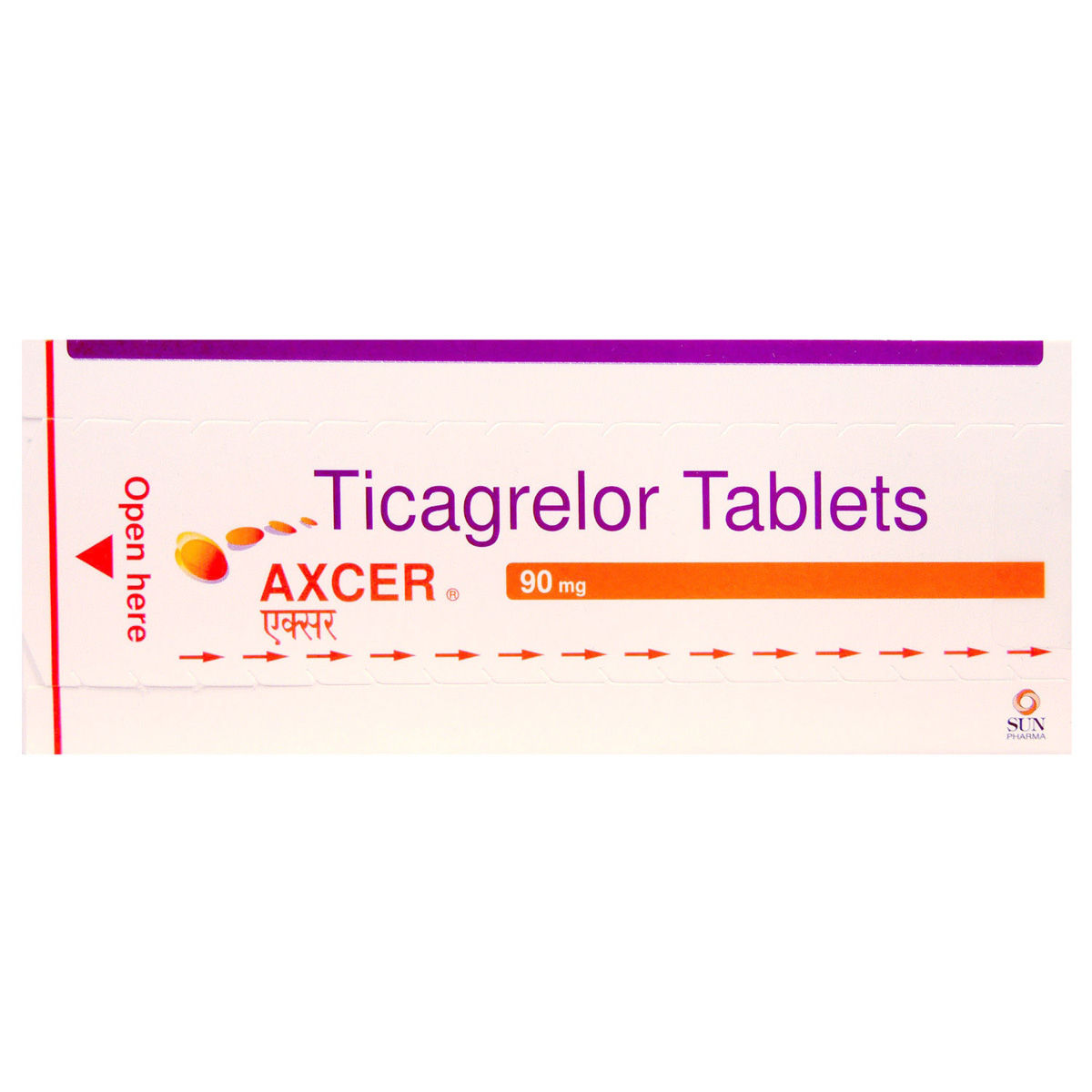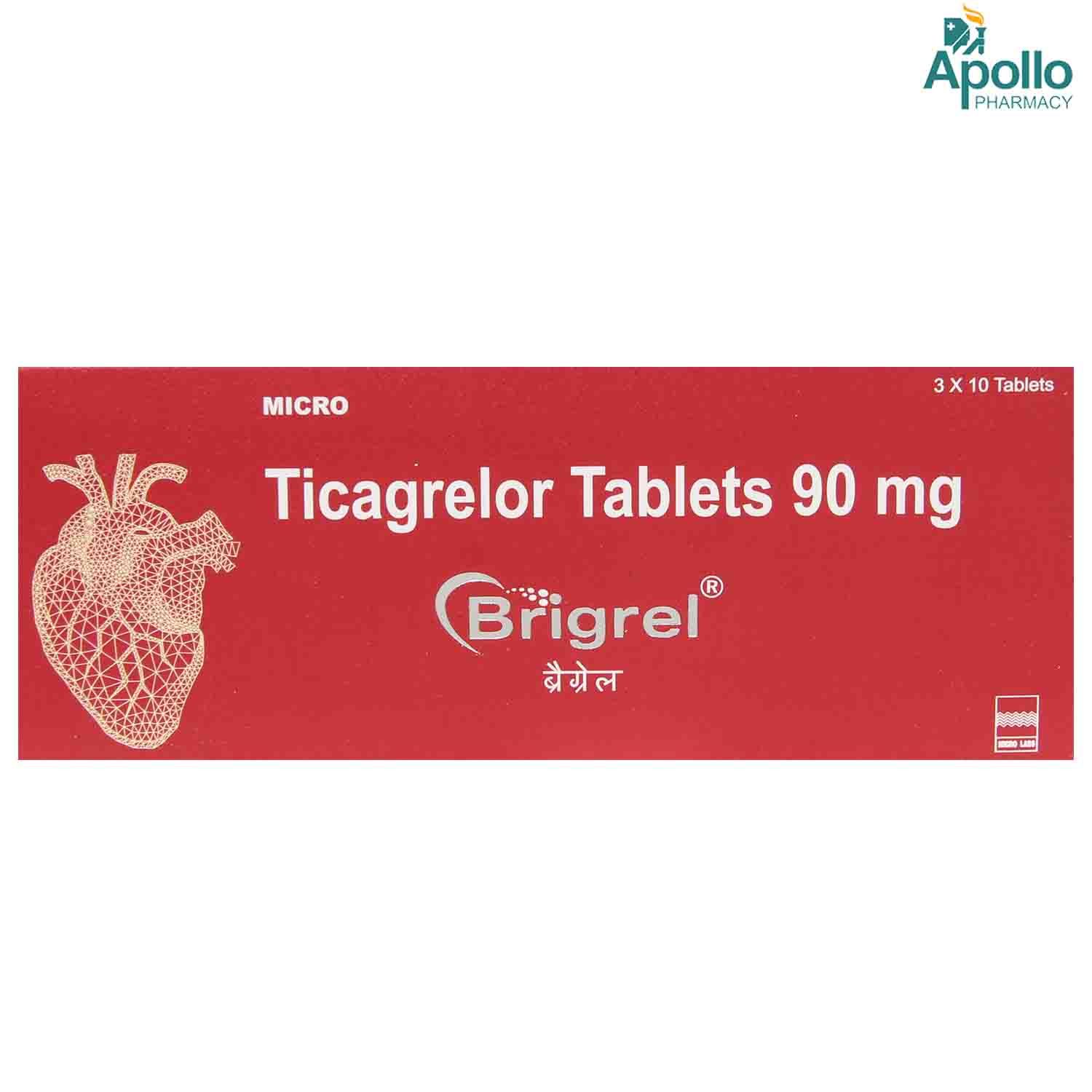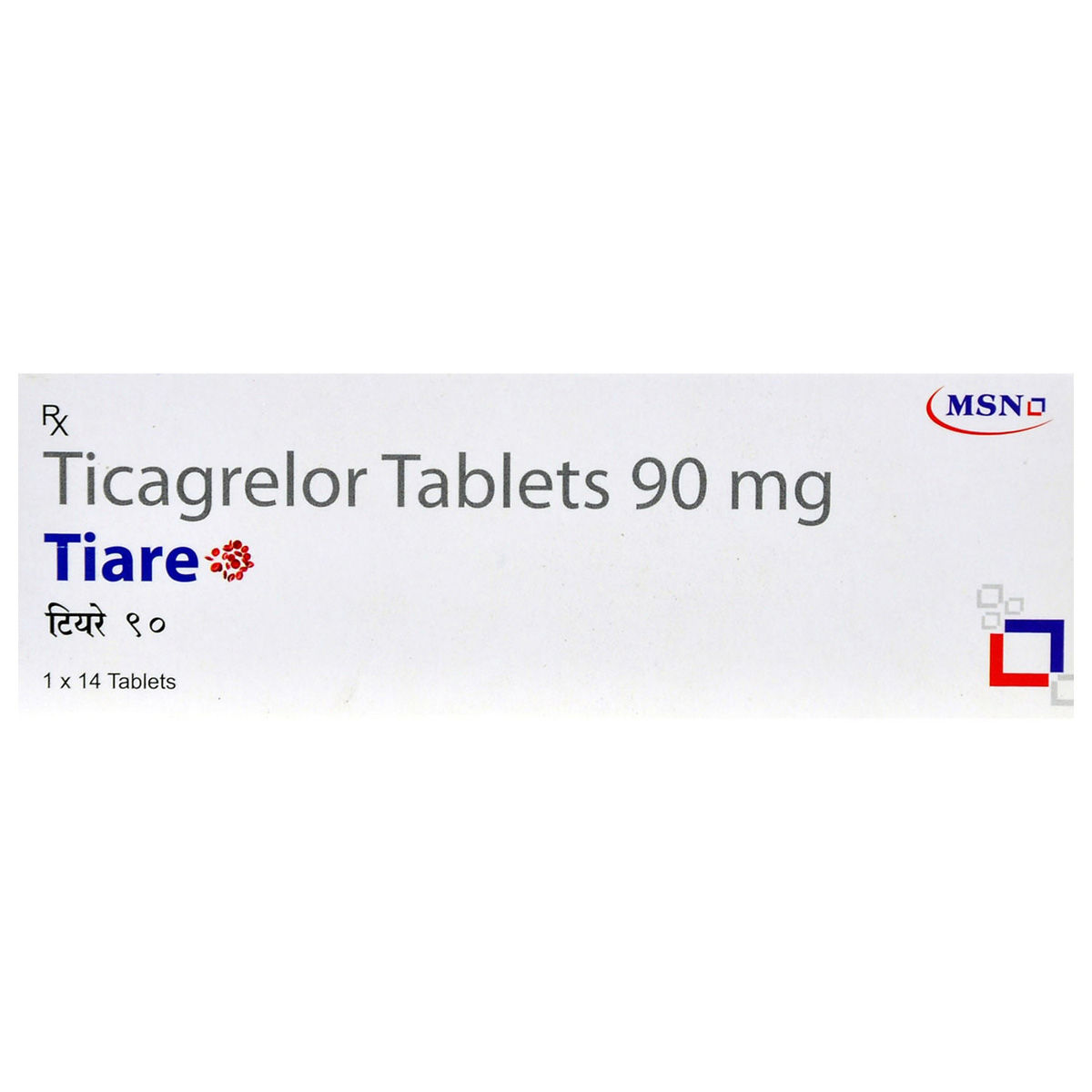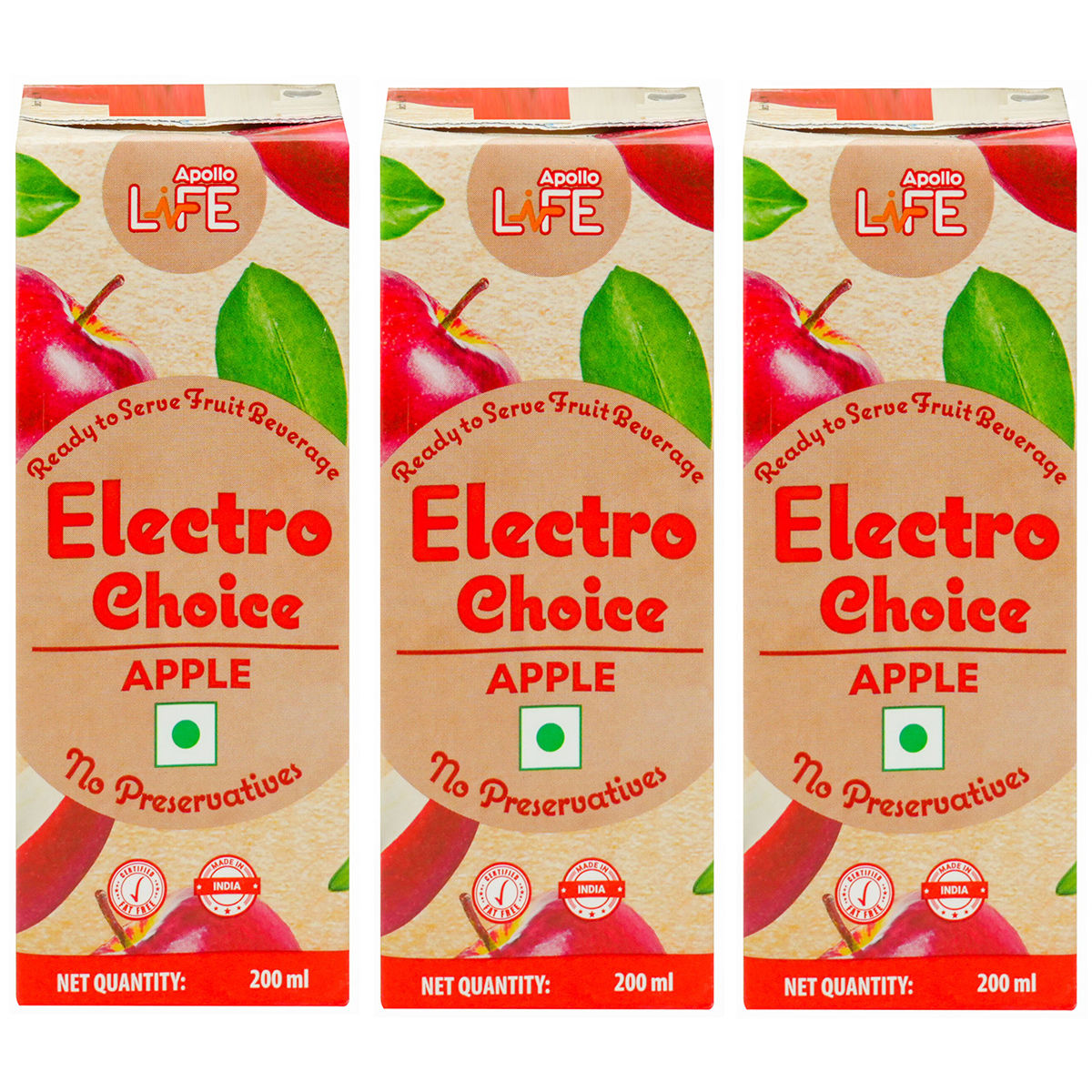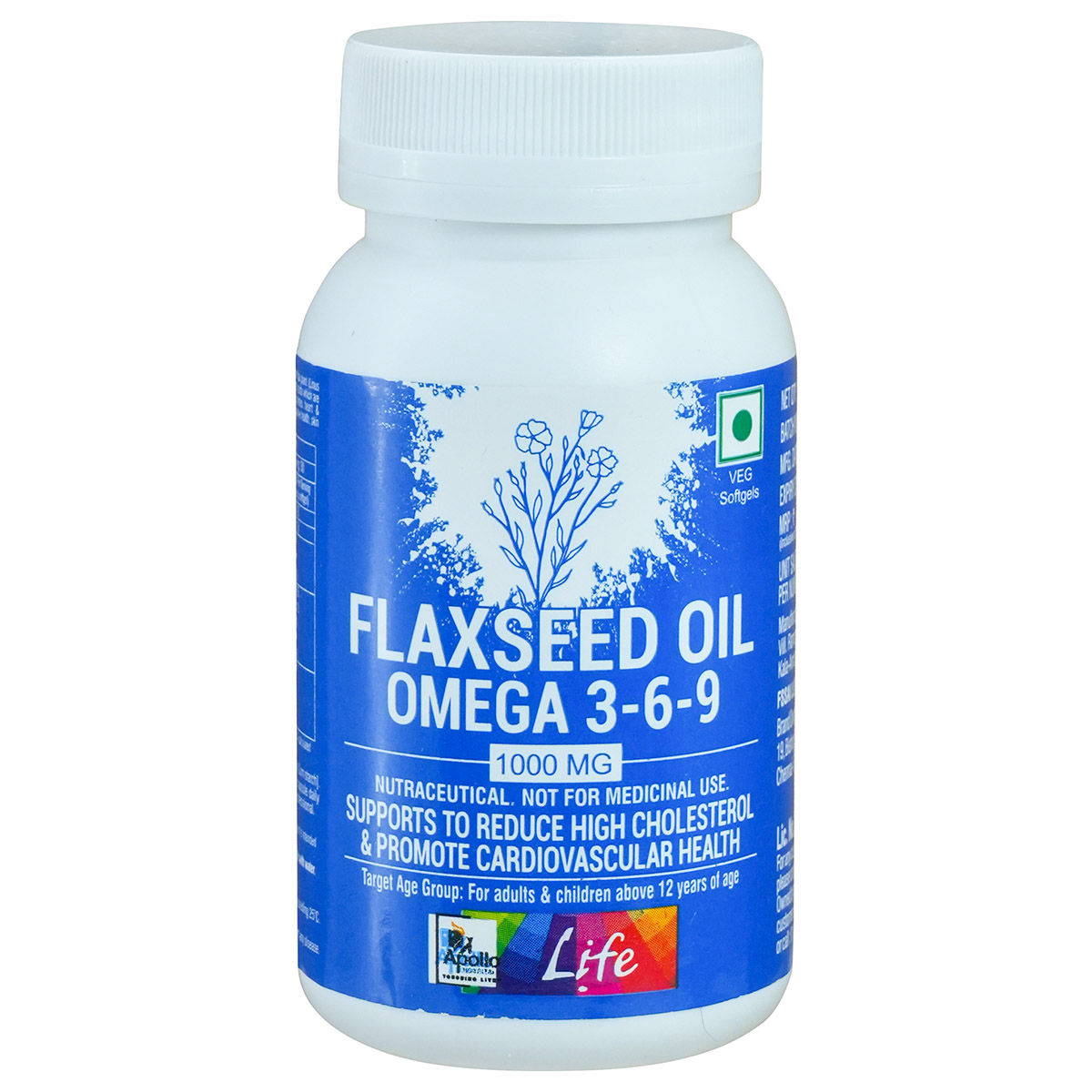Brilinta 90 mg Tablet 14's
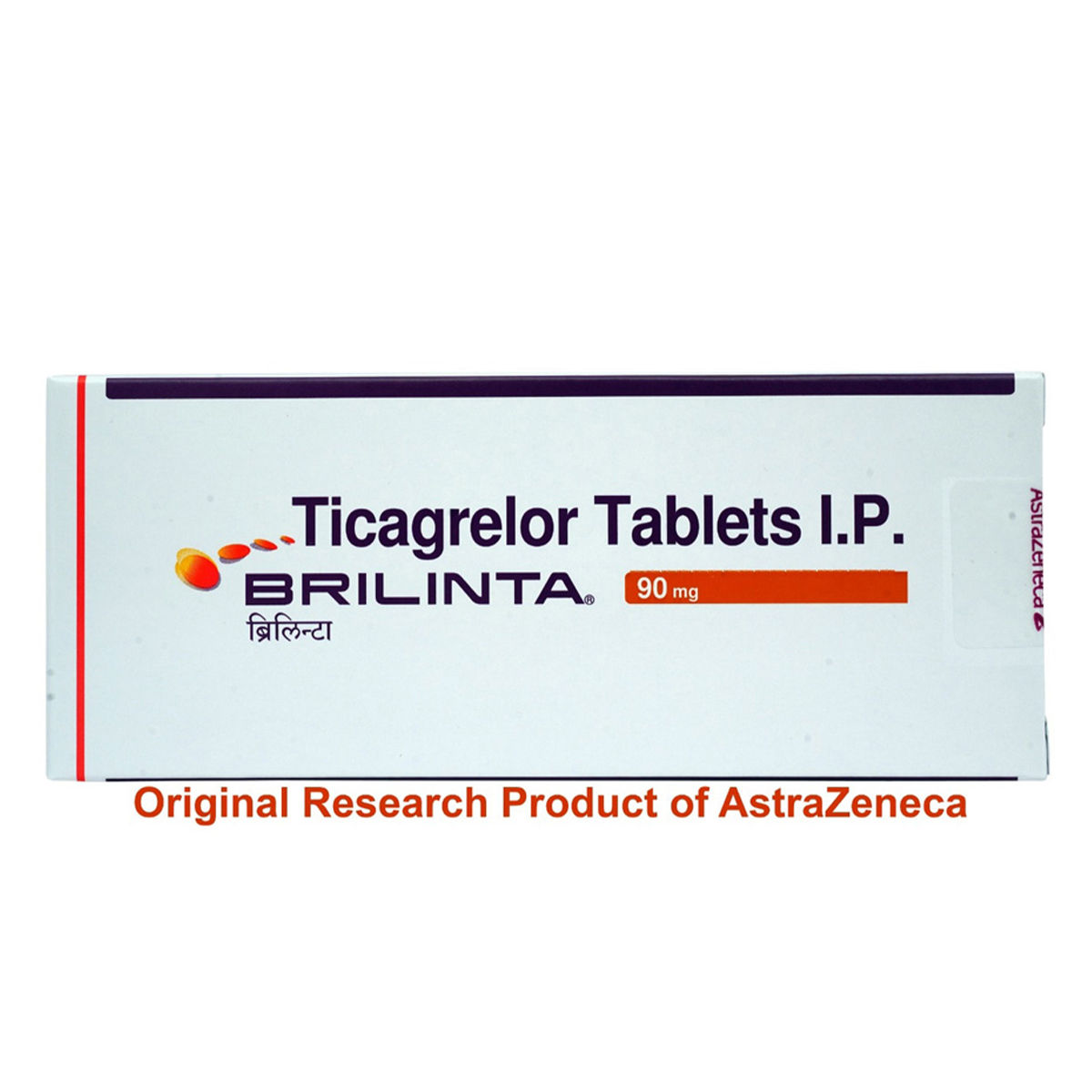



₹531.5*
MRP ₹590.5
10% off
₹501.92*
MRP ₹590.5
15% CB
₹88.58 cashback(15%)
Free Delivery
With Circle membership
(Inclusive of all Taxes)
This offer price is valid on orders above ₹800. Apply coupon PHARMA10/PHARMA18 (excluding restricted items)
Brilinta 90 mg Tablet is taken to prevent heart attack or stroke in people at high risk of heart disease. It helps to prevent blood clots in people with acute coronary syndrome (heart doesn't receive enough oxygen) who have had stents placed in blood vessels in their heart. It contains Ticagrelor, which prevents blood clot formation in the blood vessels by making platelets less sticky. In some cases, you may experience dyspnea (shortness of breath), tightness in the chest, blurred vision, nosebleeds, dizziness, faintness, or lightheadedness. Before taking this medicine, you should tell your doctor if you are allergic to any of its components or if you are pregnant/breastfeeding, and about all the medications you are taking and pre-existing medical conditions.
Know Your Delivery Time
Provide Delivery Location
Selected Pack Size:14
14 ₹531.5
(₹37.96 per unit)
In Stock
180 ₹4490.3
(₹24.95 per unit)
In Stock
120 ₹4490.3
(₹37.42 per unit)
In Stock
Available Offers
 Prescription drug
Prescription drugWhats That
 712 people bought
712 people bought 
Secure Payment

India's Most Trusted Pharmacy

Genuine Products
Composition :
Manufacturer/Marketer :
Consume Type :
Return Policy :
Expires on or after :
About Brilinta 90 mg Tablet
Brilinta 90 mg Tablet belongs to the antiplatelet drugs (blood thinners) primarily taken to prevent heart attack or stroke in people at high risk of heart disease. Brilinta 90 mg Tablet helps to prevent blood clots in people with acute coronary syndrome (heart doesn't receive enough oxygen) who have had stents placed in blood vessels in their heart. A heart attack occurs when a blood clot blocks the blood flow to the heart. This blockage of arteries is often an accumulation of cholesterol, fat, and other substances, which form plaque in the arteries that feed the heart (coronary arteries). A heart attack signs include chest pain, upper body pain, sweating, nausea, fatigue, and trouble breathing.
Brilinta 90 mg Tablet contains Ticagrelor, which is a blood thinner that prevents clot formation in the blood vessels. Platelets are blood cells that stick together and block any cuts and breaks in blood vessels. But platelets can stick together inside already narrowed blood vessels to form a clot in people at risk of heart attack or stroke. The clot can stop blood from flowing to the heart or brain and cause a heart attack or stroke. Here, Brilinta 90 mg Tablet slows the blood's clotting action by making platelets less sticky.
Your doctor will advise you how often you take Brilinta 90 mg Tablet based on your medical condition. In some cases, you may experience dyspnea (shortness of breath), tightness in the chest, blurred vision, nosebleeds, dizziness, faintness, or lightheadedness. If side effects are persistent, talk to your doctor. Brilinta 90 mg Tablet may cause you to bleed more easily. You should not take Brilinta 90 mg Tablet if you have bleeding in your brain, a problem with blood flow, or any other bleeding risk factor.
Before taking the Brilinta 90 mg Tablet , let your doctor know about all your allergic or hypersensitivity reactions to medicines or food. Brilinta 90 mg Tablet should not be stopped even if you feel better without consulting your doctor, as stopping a sudden intake of Brilinta 90 mg Tablet may worsen your condition and increase the risk of a future heart attack. The patient should inform the doctor that they are taking Brilinta 90 mg Tablet before any surgery is scheduled or any new medicine is taken. Don't take Brilinta 90 mg Tablet before or after having heart bypass surgery. Before using Brilinta 90 mg Tablet , consult your doctor if you are pregnant, planning to become pregnant, or breastfeeding.
Uses of Brilinta 90 mg Tablet
Directions for Use
Medicinal Benefits
Brilinta 90 mg Tablet is an antiplatelet (blood thinner) and plays a vital role in preventing the formation of harmful blood clots in your blood vessels. Brilinta 90 mg Tablet work by preventing platelets from sticking together, thereby decreasing the formation of harmful blood clots. Thus, it reduces the risk of heart attack, stroke, and acute coronary syndrome (heart doesn't receive enough oxygen or blood) in heart disease patients and patients who have undergone recent heart surgery with a stent.
How Brilinta 90 mg Tablet Works
Storage
- Tell your doctor immediately if you experience shortness of breath after taking medication.
- Your doctor may adjust the medication regimen or dosage or give alternative medical procedures to minimize the symptoms of shortness of breath.
- Monitor your oxygen levels and breathing rate regularly to track changes and potential side effects.
- For controlling stress and anxiety, try relaxation techniques like deep breathing exercises, meditation, or yoga.
- Make lifestyle changes, such as quitting smoking, exercising regularly, and maintaining a healthy weight.
- Seek emergency medical attention if you experience severe shortness of breath, chest pain, or difficulty speaking.
- Follow up regularly with your doctor to monitor progress, adjust treatment plans, and address any concerns or questions.
- If you experience nosebleeds or unusual bleeding after taking medication, seek medical attention right away and schedule an appointment to discuss your symptoms with your doctor.
- Your doctor may adjust your treatment plan by changing the dosage, switching to a different medication, or stopping the medication.
- If your doctor advises, take steps to manage bleeding and promote healing, such as applying pressure, using saline nasal sprays, or applying a cold compress, using humidifiers, avoiding blowing or picking your nose, and applying petroleum jelly to the nostrils.
- Schedule follow-up appointments with your doctor to monitor progress, adjust treatment plans, and prevent future episodes.
- Tell your doctor about the cough symptoms you're experiencing, which may be triggered by your medication.
- Your doctor may adjust your treatment plan by changing your medication, adding new medications, or providing guidance on managing your cough symptoms.
- Practice good hygiene, including frequent handwashing, avoiding close contact with others, and avoiding sharing utensils or personal items.
- Stay hydrated by drinking plenty of fluids, such as water, tea, or soup, to help thin out mucus and soothe your throat.
- Get plenty of rest and engage in stress-reducing activities to help your body recover. If your cough persists or worsens, consult your doctor for further guidance.
- If you experience low blood pressure symptoms like dizziness, lightheadedness, or fainting while taking medication, seek immediate medical attention.
- Make lifestyle modifications and adjust your medication regimen under medical guidance to manage low blood pressure.
- As your doctor advises, regularly check your blood pressure at home. Record your readings to detect any changes and share them with your doctor.
- Fluid intake plays a vital role in managing blood pressure by maintaining blood volume, regulating blood pressure, and supporting blood vessel function. Drinking enough fluids helps prevent dehydration, maintain electrolyte balance, and regulate fluid balance.
- Take regular breaks to sit or lie down if you need to stand for long periods.
- When lying down, elevate your head with extra pillows to help improve blood flow.
- Avoid heavy exercise or strenuous activities that can worsen low blood pressure.
- Wear compression socks as your doctor advises to enhance blood flow, reduce oedema, and control blood pressure.
- If symptoms persist or worsen, or if you have concerns about your condition, seek medical attention for personalized guidance and care.
- Wear compression garments like stockings, sleeves, or gloves to apply pressure and help stop fluid from building up, especially after the swelling goes down.
- Move around and do exercises to help the fluid circulate, especially in swollen limbs. Ask your doctor for specific exercises.
- Raise the swollen area above your heart level several times a day, even while sleeping, to help reduce swelling.
- Gently massage the swollen area with firm but not painful pressure.
- Keep the swollen area clean and moisturized to prevent injury and infection.
- Reduce salt intake to help prevent fluid from building up and worsening the swelling, as advised by a doctor.
- If the swelling does not get better after a few days of home treatment or worsens, consult your doctor right away.
- Talk to your doctor about your back pain and potential medication substitutes or dose changes.
- Try yoga or Pilates and other mild stretching exercises to increase flexibility and strengthen your back muscles.
- To lessen the tension on your back, sit and stand upright and maintain proper posture.
- To alleviate discomfort and minimize inflammation, apply heat or cold packs to the afflicted area.
- Under your doctor's supervision, think about taking over-the-counter painkillers like acetaminophen or ibuprofen.
- Make ergonomic adjustments to your workspace and daily activities to reduce strain on your back.
- To handle tension that could make back pain worse, try stress-reduction methods like deep breathing or meditation.
- Use pillows and a supportive mattress to keep your spine in the right posture as you sleep.
- Back discomfort can worsen by bending, twisting, and heavy lifting.
- Speak with a physical therapist to create a customized training regimen to increase back strength and flexibility.
What if I have taken an overdose of Brilinta 90 mg Tablet
Drug Warnings
You should avoid taking Brilinta 90 mg Tablet if you are allergic to Brilinta 90 mg Tablet or any active and inactive ingredients present in it. Let your doctor know if you have a medical condition that causes bleeding such as hemophilia, stomach ulcer, or bleeding in your head or bowel. Caution is required before giving Brilinta 90 mg Tablet to the kidney or liver problems patients. People affected with respiratory problems like asthma, nasal polyps, or rhinitis should consult a doctor before intake of Brilinta 90 mg Tablet . Brilinta 90 mg Tablet is not recommended for the breastfeeding mother as it passes into the breast milk. The safety and effectiveness in children less than 18 years of age have not been established, so Brilinta 90 mg Tablet should not be given to them.
Drug-Drug Interactions
Drug-Drug Interactions
Login/Sign Up
Co-administration of Brilinta 90 mg Tablet with ketoconazole can cause severe bleeding.
How to manage the interaction:
Taking Brilinta 90 mg Tablet with Ketoconazole is not recommended as it can cause an interaction, it can be taken if prescribed by the doctor. However, if you experience any unusual bleeding or bruising, swelling, vomiting, blood in your urine or stools, headache, dizziness, or weakness, contact a doctor immediately. Do not discontinue any medications without consulting a doctor.
Taking Brilinta 90 mg Tablet with Ritonavir may significantly increase the blood levels of Brilinta 90 mg Tablet.
How to manage the interaction:
Taking Brilinta 90 mg Tablet with Ritonavir is not recommended, but it can be taken together if prescribed by a doctor. However, consult your doctor if you experience any unusual bleeding or bruising, swelling, vomiting, blood in your urine or stools, headache, dizziness, or weakness. Do not discontinue any medications without consulting a doctor.
Co-administration of Brilinta 90 mg Tablet with Conivaptan can increase the risk of bleeding.
How to manage the interaction:
Taking Brilinta 90 mg Tablet with Conivaptan is not recommended, please consult your doctor before taking it. However, if you experience unusual bleeding or bruising, swelling, vomiting, blood in your urine or stools, headache, dizziness, or weakness contact your doctor immediately. Do not discontinue any medications without consulting a doctor.
Co-administration of Mifepristone with Brilinta 90 mg Tablet can increase the risk of vaginal bleeding in women.
How to manage the interaction:
Taking Brilinta 90 mg Tablet with Mifepristone is not recommended, but can be taken together if prescribed by a doctor. However, consult your doctor if you experience any symptoms like heavy period bleed for more than 7 days, weakness, tiredness, shortness of breath or paleness. Do not discontinue any medications without consulting a doctor.
Co-administration of posaconazole with Brilinta 90 mg Tablet can increase the risk of bleeding.
How to manage the interaction:
Taking Brilinta 90 mg Tablet with Posaconazole is not recommended, but it can be taken together if prescribed by a doctor. However, consult your doctor if you experience any unusual bleeding or bruising, swelling, vomiting, blood in your urine or stools, headache, dizziness, or weakness. Do not discontinue any medications without consulting a doctor.
Using Brilinta 90 mg Tablet together with Voriconazole can significantly increase the blood levels of Brilinta 90 mg Tablet.
How to manage the interaction:
Taking Brilinta 90 mg Tablet with Voriconazole is not recommended, but it can be taken together if prescribed by a doctor. However, consult a doctor if you experience vomiting, headache, dizziness, or weakness. Do not discontinue any medications without consulting a doctor.
Using Brilinta 90 mg Tablet together with indinavir can cause risk of bleeding.
How to manage the interaction:
Taking Brilinta 90 mg Tablet with Indinavir is not recommended, but it can be taken together if prescribed by a doctor. However, consult a doctor if you experience any unusual bleeding or bruising, swelling, vomiting, blood in your urine or stools, headache, dizziness, or weakness. Do not discontinue any medications without consulting a doctor.
The blood levels and effects of Brilinta 90 mg Tablet may be greatly increased when combined with itraconazole.
How to manage the interaction:
Itraconazole and Brilinta 90 mg Tablet may interact, however if prescribed by a physician, they can be used together. While receiving therapy, you should consult a doctor if you develop any unusual bleeding or bruising, swelling, vomiting, blood in your urine or stools, headache, dizziness, or weakness. Without consulting a doctor, never stop taking any medication.
Using Brilinta 90 mg Tablet together with telithromycin cause increase the blood levels of Brilinta 90 mg Tablet.
How to manage the interaction:
Taking Brilinta 90 mg Tablet with Telithromycin is not recommended, but it can be taken together if prescribed by a doctor. However, consult your doctor if you experience any unusual bleeding or bruising, swelling, vomiting, blood in your urine or stools, headache, dizziness, or weakness. Do not discontinue any medications without consulting a doctor.
Taking Brilinta 90 mg Tablet with rivaroxaban can increase the risk or severity of bleeding problems.
How to manage the interaction:
Taking Rivaroxaban with Brilinta 90 mg Tablet together can possibly result in an interaction, it can be taken if your doctor has advised it. However, if you notice any unusual bleeding or bruising, dizziness, lightheadedness, red or black tarry stools, coughing up or vomiting blood, severe headache, and weakness, you should contact your doctor immediately. Do not stop using any medications without consulting your doctor.
Drug-Food Interactions
Drug-Food Interactions
Login/Sign Up
Diet & Lifestyle Advise
Reducing weight and having a healthy BMI is very important in enhancing cardiac health.
30 minutes of daily physical exercise can go a long way in preventing heart disease.
Avoid smoking to improve cardiac health.
Invest in a healthy, balanced diet. Avoid fatty foods, keep your cholesterol in check and load up on the green leafy vegetables, fish, lean meats, nuts and dry fruits.
Reducing stress is very important in keeping a healthy heart. Try yoga and meditation for a relaxed state of mind.
Habit Forming
Therapeutic Class
Brilinta 90 mg Tablet Substitute

Brilinta 90 mg Tablet 180's
by AYUR
₹24.95per tabletAxcer 90 mg Tablet 14's
by Others
₹30.83per tabletAxcer 90 mg Tablet 180's
by AYUR
₹18.75per tabletTorplat 90 Tablet 14's
by AYUR
₹25.30per tabletTicabid 90 Tablet 10's
by Others
₹28.94per tablet
Product Substitutes
Alcohol
Unsafe
It is unsafe to consume alcohol since it may worsen the side effects like dizziness and increases blood pressure.
Pregnancy
Caution
Please consult the doctor. There are no adequate and well-controlled studies on pregnant women. Your doctor will prescribe only if the benefits outweigh the risks.
Breast Feeding
Unsafe
Brilinta 90 mg Tablet may pass into breast milk and may cause side effects in a breastfed child. Please consult your doctor before starting Brilinta 90 mg Tablet .
Driving
Caution
Do not drive or operate machinery if you experience dizziness or drowsiness while using Brilinta 90 mg Tablet .
Liver
Caution
Let your doctor know if you had or have any history of liver disease or hepatic impairment. Your doctor will weigh the benefits and potential risks before prescribing Brilinta 90 mg Tablet . However, Brilinta 90 mg Tablet is not recommended in patients with severe liver problems.
Kidney
Caution
Let your doctor know if you had or have any history of kidney diseases/conditions. Your doctor will weigh the benefits and potential risks before prescribing Brilinta 90 mg Tablet . However, Brilinta 90 mg Tablet is not recommended in patients with severe kidney problems.
Children
Caution
Brilinta 90 mg Tablet is not recommended for children below the age of 18 years. The safety and effectiveness of Brilinta 90 mg Tablet have not been established in children.
FAQs
Brilinta 90 mg Tablet is primarily used to prevent heart attack or stroke in people at high risk of heart disease. It helps to prevent blood clots in people with acute coronary syndrome (the heart doesn't receive enough oxygen) who have had stents placed in blood vessels in their heart.
If the Brilinta 90 mg Tablet is taken every day, the Brilinta 90 mg Tablet stops platelets from clumping together to form unwanted blood clots and prevents heart attacks and strokes.
Yes, taking Brilinta 90 mg Tablet can increase the risk of bleeding. So, please be very cautious while cutting fingernails or toenails, shaving, or using sharp objects to avoid bleeding.
Please consult your doctor if Brilinta 90 mg Tablet needs to be stopped before undergoing surgery. The doctor might ask you to stop taking Brilinta 90 mg Tablet a few days before surgery since it can cause an increased risk of bleeding during surgery.
There might be a problem if you take herbal therapies with Brilinta 90 mg Tablet , especially those that affect blood like Ginkgo Biloba, Grapefruits, St John's wort plant extract used as an antidepressant. Taking together can increase your risk of bleeding. Tell your doctor if you are using any herbal supplements before taking Brilinta 90 mg Tablet .
No, Brilinta 90 mg Tablet may make it harder to breathe. Consult your doctor if the problem persists, he/she may adjust the dose or prescribe an alternative medicine.
Do not drink grapefruit juice while taking Brilinta 90 mg Tablet . Grapefruit juice may increase the blood-thinning effect of the medicine.
Brilinta 90 mg Tablet contains ticagrelor, which when taken with clopidogrel may increase the risk of bleeding. Consult the doctor before taking other medicines with Brilinta 90 mg Tablet .
Brilinta 90 mg Tablet should not be discontinued without a doctor's consultation. Stopping Brilinta 90 mg Tablet might increase the risk of a heart attack or stroke.
Brilinta 90 mg Tablet may cause blood in urine. Consult the doctor if you experience this.
Brilinta 90 mg Tablet might lower the blood pressure. Let the doctor know if you are taking anti-hypertensives (blood pressure-lowering medicines). Regular monitoring of blood pressure levels is advised.
Brilinta 90 mg Tablet can be taken with other medicines if prescribed by the doctor. Before starting Brilinta 90 mg Tablet inform the doctor if you are taking any other medicines to prevent interactions.
Brilinta 90 mg Tablet is an antiplatelet medicine which inhibits the aggregation of platelets that may cause a heart attack or stroke.
Limit alcohol consumption with Brilinta 90 mg Tablet as it might increase the risk of bleeding.
Brilinta 90 mg Tablet may cause significant, sometimes fatal bleeding. Inform the doctor if you have/had a condition that causes you to bleed more easily than normal; bleeding in your stomach, intestines, or brain; stomach ulcer; polyps (abnormal growths in the lining of the large intestine); a stroke or mini-stroke; or liver disease. Seek immediate medical attention if you experience unexplained, severe, long-lasting, or uncontrollable bleeding; red or black, tarry stools; pink or brown urine; vomit that is bloody or that looks like coffee grounds; or coughing up blood or blood clots.
Brilinta 90 mg Tablet works within 30 minutes of taking the first dose.
Country of origin
Manufacturer/Marketer address
Customers Also Bought
Disclaimer
Author Details
We provide you with authentic, trustworthy and relevant information
Recommended for a 30-day course: 5 Strips













